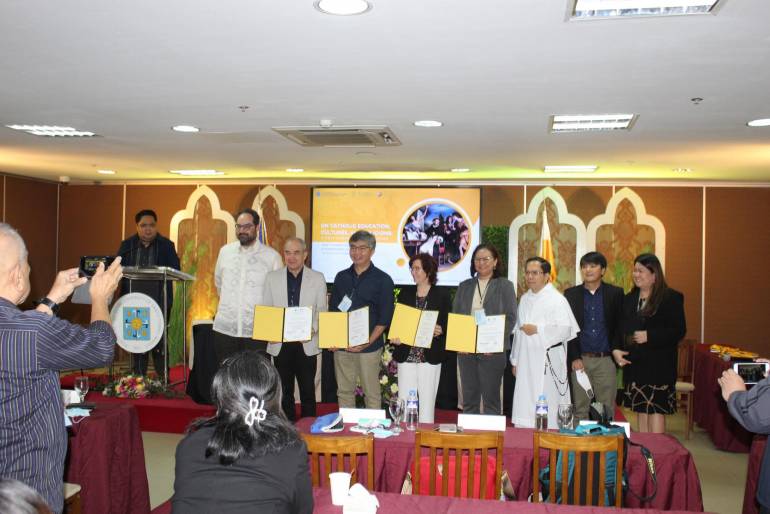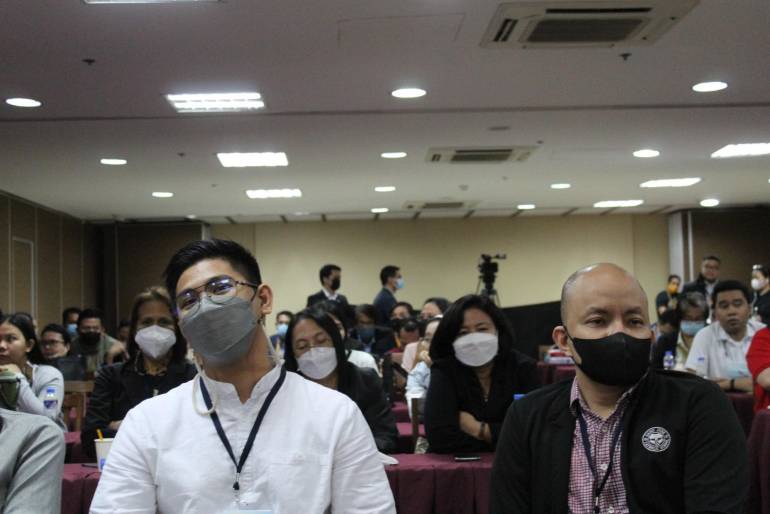Philippines: UST holds Academic forum on Education, Cultures, and Religions

The University of Santo Thomas (UST) held the Annual Saint Thomas Aquinas Forum (STAF) on education, cultures, and religions on the Manila campus on April 29.
Over 260 participants from the Philippines, Indonesia, Vietnam, Japan, and Italy joined the “hyflex” meeting, 112 of whom attended via Zoom video conferencing.
UST co-hosted this year’s conference with the Instituto Universitario Sophia (IUS) in Florence, Italy, and the Libera Università degli Studi Maria Assunta (LUMSA) in Roma.
All three higher education institutions are members of the ten-body “Global Compact for Education Observatory,” formed in 2020 following Pope Francis’ 2019 call to create an international alliance for Catholic education.
In response to that call, the April 28–29 STAF 2023 was themed “Catholic Education, Cultures, and Religions” in the post-pandemic era.
This year’s event aims to provide a platform for exchange in building an “educational village,” which Pope Francis said should be based on “open and human relationships.”
The Grand Imam of Al-Azha and Pope Francis co-signed a 2019 document in which the Holy Father stated that an environment free from prejudice and where fraternity thrives must come before education.
Technology-driven changes threatening traditional paradigms call for education that “unifies and respects all aspects of the human person,” the document states, to maintain the “solidity and psychological structure” of the human identity.
STAF 2023 is an opportunity for Catholic theologians, scholars, educators, formators, and students to discuss and reflect on these issues from a spiritual and theological standpoint.
Participants from the Philippines and Asia will be able to update on trends in contemporary Catholic education in the spirit of unity, sharing, and dialogue.
One of the speakers, Dr. Declan O'Byrne, spoke about "Interreligious and Intercultural Exchange in the Global Village" and echoed the Pope's 2015 Encyclical Laudato Si analysis that education today is threatened by a phenomenon known as "rapidification."
Through "high-speed technology and computerization," he explained, this process "traps humanity's existence" and "alters traditional points of reference," resulting in a "loss of people's identity and psychological structure."
O'Byrne then emphasized the need to foster interreligious and intercultural exchanges to the extent that they enable a deeper appreciation of one's identity and the realization of his "giftedness for others" simultaneously.
As O'Byrne put it, putting our resources into a "village of education" promotes "open collaboration, engagement, and the sharing of positive experiences with others."
While communication technologies are deemed advantageous for specific "interaction processes," they have yet to demonstrate their capacity to "develop wisdom," "build peace," and preserve cultural diversity, he said.
To "develop wisdom" and "mature as individuals" in today's interconnected "global village," he added, people must remain receptive to "offline" or physical interactions. Every individual and community must strike a balance between the local and global.

The second speaker, Dr. Maria Cinque, dean of LUMSA's human sciences department, discussed opportunities and obstacles in promoting "Catholic Education in the Digiverse."
Digiverse, or the network of digital applications influencing people's lives, results in a blended "online" and "offline" lived experience. This phenomenon, which Cinque calls "onlife," poses challenges for cyberspace's utilization and overall governance.
From convergence in "digital squares" such as chatrooms and blog spots, the professor exhorted the necessary and complementary shift towards "physical" spaces where genuine learning, sharing, networking, and even pastoral care can occur.
Cinque echoed Pope Francis' call for responsibility, dedication, and ethical use to actualize the positive potentials of communication technologies, which, when abused, compromise "fairness" in classroom management.
In a meeting held in April 2023 at the Vatican, the Pope stated, "I am convinced that the development of artificial intelligence and machine learning has the potential to contribute positively to the future of humanity; we cannot dismiss it."
"At the same time, I am certain that this potential will only be realized if there is a constant and consistent commitment on the part of those developing these technologies to act ethically and responsibly," the Pope continued.
In closing remarks, Father Pablo T. Tiong, OP, Vice-Rector for Religious Affairs at the University of Santo Tomas, commended the organizers and everyone who made STAF 2023 possible.
He expressed optimism that the Global Compact on Education's partner institutions will continue to respond to the call for a "village of education" that places the human being at the center of "every educative endeavor."
The priest entrusted Catholic education's continued relevance and advancement to UST's patron, Saint Thomas Aquinas, whose 700th canonization anniversary will be celebrated on March 7, 2024.-Anthony G. Roman
Radio Veritas Asia (RVA), a media platform of the Catholic Church, aims to share Christ. RVA started in 1969 as a continental Catholic radio station to serve Asian countries in their respective local language, thus earning the tag “the Voice of Asian Christianity.” Responding to the emerging context, RVA embraced media platforms to connect with the global Asian audience via its 21 language websites and various social media platforms.













